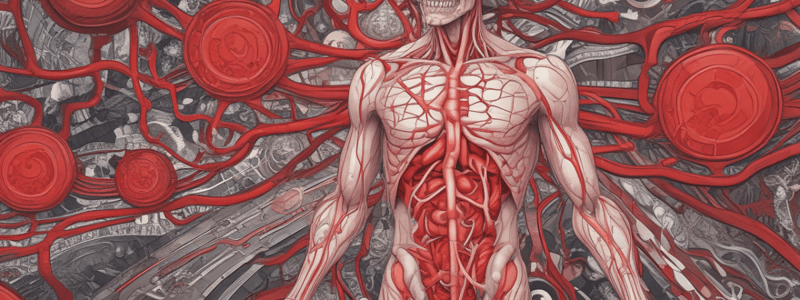Podcast
Questions and Answers
What is the role of hemoglobin in regulating the hydrogen ion concentration?
What is the role of hemoglobin in regulating the hydrogen ion concentration?
- As a component of blood group antigens
- As a mediator of blood clotting
- As a carrier of oxygen only
- As a buffer to maintain acid-base balance (correct)
What is the primary function of neutrophils?
What is the primary function of neutrophils?
- To regulate blood clotting
- To carry blood group antigens
- To transport carbon dioxide
- To defend against invading microorganisms (correct)
Which of the following is NOT a function of eosinophils?
Which of the following is NOT a function of eosinophils?
- Releasing histamine during hypersensitivity reactions
- Participating in blood clotting (correct)
- Destroying worms and bacteria
- Secreting lethal substances against parasites
What is the role of basophil granules?
What is the role of basophil granules?
What is the primary function of platelets?
What is the primary function of platelets?
What is the function of carboxyhemoglobin?
What is the function of carboxyhemoglobin?
What is the primary function of albumin in plasma?
What is the primary function of albumin in plasma?
What is the main function of the interstitial fluid in the body?
What is the main function of the interstitial fluid in the body?
What is the approximate percentage of plasma in blood composition?
What is the approximate percentage of plasma in blood composition?
Which type of leukocytes constitutes 60-70% of the total WBC count?
Which type of leukocytes constitutes 60-70% of the total WBC count?
What is the largest component of the extracellular fluid?
What is the largest component of the extracellular fluid?
What is the function of fibrinogen in blood plasma?
What is the function of fibrinogen in blood plasma?
What is the term for the maintenance of nearly constant conditions in the internal environment?
What is the term for the maintenance of nearly constant conditions in the internal environment?
What is the primary function of red blood cells?
What is the primary function of red blood cells?
What is the primary function of the kidneys in maintaining homeostasis?
What is the primary function of the kidneys in maintaining homeostasis?
What is the second largest volume of fluid in the body?
What is the second largest volume of fluid in the body?
What is the percentage of water in blood plasma?
What is the percentage of water in blood plasma?
What is the term for the system that transports extracellular fluid throughout the body?
What is the term for the system that transports extracellular fluid throughout the body?
Study Notes
Body Temperature Regulation
- Water has high heat capacity, thermal conductivity, and heat of vaporization, which helps regulate body temperature
- Typical heat generation is 3000 kcal/day
Blood Composition
- Blood is a suspension of cells in plasma (carrier fluid)
- Cells make up 45% of blood, while plasma makes up 55%
- Red blood cells (erythrocytes) are 5x10^6/mL
- White blood cells (leukocytes) are 7x10^3/mL
- Platelets (thrombocytes) are 3x10^5/mL
Blood Plasma
- Plasma is a straw-colored clear liquid that contains 90% water
- 7% of plasma is made up of plasma proteins, which are created in the liver and confined to the bloodstream
- Plasma proteins include:
- Albumin, which maintains blood osmotic pressure
- Immunoglobulins, which are antibodies that bind to foreign substances called antigens
- Fibrinogen, which is involved in blood clotting
- Other substances in plasma include nutrients, electrolytes, gases, hormones, and waste products
Functions of Plasma Proteins
- Coagulation of blood
- Defense mechanism
- Transport mechanism
- Maintenance of osmotic pressure
- Acid-base balance
- Providing viscosity to blood
- Providing suspension stability of RBC
Formed Elements of Blood
- Red blood cells (RBC)
- White blood cells (WBC)
- Granular leukocytes: neutrophils (60-70%), eosinophils (1-4%), and basophils (1%)
- Agranular leukocytes: lymphocytes (20-40%) and monocytes (3-10%)
- Platelets (special cell fragments)
Functions of RBC
- Transport oxygen from lungs to tissues
- Transport carbon dioxide from tissues to lungs
- Hemoglobin acts as a buffer and regulates hydrogen ion concentration (acid-base balance)
- Carry blood group antigens and Rh factor
Functions of Neutrophils
- First line of defense against invading microorganisms
- Powerful and effective killer machine with enzymes like protease, elastase, metalloproteinase, and NADPH oxidase
- Secrete Platelet Aggregation Factor (PAF) to accelerate platelet aggregation during injury
Functions of Eosinophils
- Secrete lethal substances to destroy foreign proteins and parasites
- Secrete eosinophil peroxidase, major basic protein, eosinophil cationic protein, and eosinophils derived neurotoxin
Functions of Basophils
- Release histamine, heparin, hyaluronic acid, and proteases from basophil granules
- Histamine causes acute hypersensitivity reactions and vascular changes
- Heparin prevents intravascular blood clotting
- Hyaluronic acid is necessary for deposition of ground substances in basement membrane
- Basophils have IgE receptors, which are involved in hypersensitivity reactions
Functions of Platelets
- Blood clotting
- Clot retraction
- Defense mechanism
Studying That Suits You
Use AI to generate personalized quizzes and flashcards to suit your learning preferences.
Related Documents
Description
This quiz covers the composition of blood, including the structure and function of plasma and blood cells, as well as thermoregulation in the human body. Topics include heat generation, heat capacity, and thermal conductivity.



